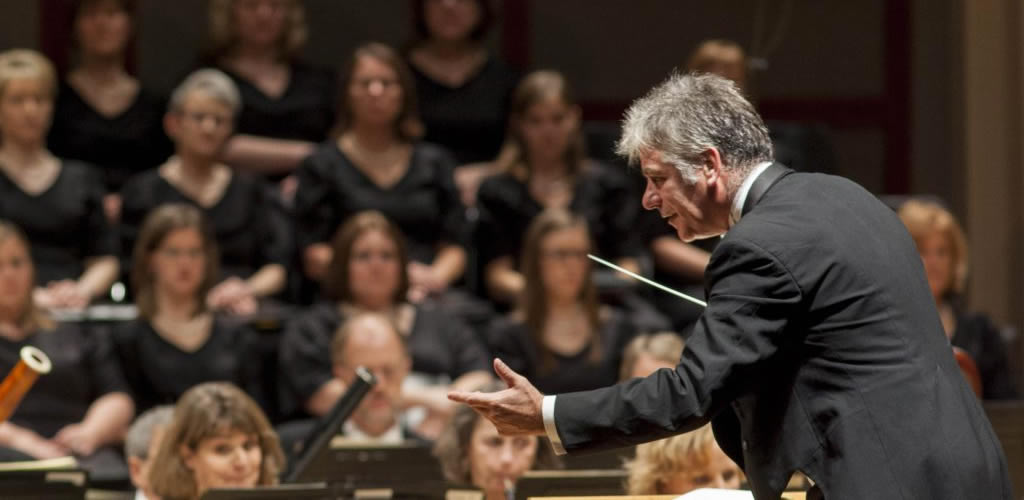Gentlemen left their swords at home, and the ladies removed the hoops from their skirts. This allowed for plenty of room for a near-capacity crowd in Meymandi Concert Hall for that most roasted of all holiday chestnuts, Handel’s Messiah. Grant Llewellyn conducted the small orchestra of the original orchestration (two oboes, bassoon, two trumpets, timpani, and strings), with the North Carolina Master Chorale (music director Alfred Sturgis), and four phenomenal soloists. During the late 19th century, performances of Messiah grew progressively slower and slower, until critics feared they would come to a complete stop. Llewellyn resisted that trend, and pulled in a performance that never dragged, and got us home at a decent hour. Kudos on that.
Before the concert, as frequently happens on Friday nights with the NCS, there was a pre-concert talk. Three of the four soloists were hosted by Catherine Brand from WUNC: Jennifer Johnson Cano, mezzo soprano; Andrew Owens, tenor; and Federico De Michelis, bass-baritone. (In the concert they were joined by Ellie Dehn, soprano.) In addition to going over their favorite parts of the music, they summed up their training and career paths. All are top-notch with both operatic and concert bookings in many countries and busy managers, too. Brand asked the crowd to hold up fingers to indicate how many performances of Messiah they had been to. Many a digit was raised to the heavens. This summed up the challenges facing both performers and audiences: how to keep it fresh? How to find something new to say with the same old same old? The soloists addressed this issue quite well, and in the following performance they did manage to keep things alive and worthwhile.
Messiah is an odd work, with a libretto by Charles Jennens that was entirely unlike the passions of Bach or the other oratorios by Handel, all of which have a clear narrative and singers taking specific character parts. Instead, the selections from the Bible are suggestive of the story of Jesus’ life, with the soloists freely associating with the material. This keeps the piece from being preachy and too much like Sunday School. Indeed, Handel had to face just this problem with his next-to-last oratorio Theodora, which the composer preferred to Messiah. It turned out to be the least-performed of his oratorios. Handel explained that “The Jews will not come to it because it is a Christian story; and the ladies will not come because it is a virtuous one.” Getting rid of an overt story and keeping things on the inspirational and suggestive side helped a lot in making Messiah a popular success.
But Handel was a man of the theater. The established Church was not amused with a sacred work penned and performed by that class of people, those who made their livings displaying the sins that the ecclesiastical divines hid so skillfully. Handel’s crowd was more suited to Saturday night than Sunday morning. It helped that, after some years, proceeds from Messiah performances went to London’s Foundling Hospital. (This was something like madam Belle Watling in Gone with the Wind showing up at the Confederate hospital to donate money.)
As the dear reader will most likely know very well, Messiah is in three parts; only the first part relates to Christmas, and as noted, only in a rather general and prophetic sense most of the time. After the opening Sinfonia, tenor Owens started off the action with the Arioso “Comfort ye my people,” which he said is his favorite part of the piece. There followed sections with bass, tenor, and alto, alternating with the chorus, with the text mostly from Isaiah; then after the Pastoral Symphony (a short little mellow movement for strings), soprano Dehn got her chance, with a text from Luke. Well, how else to render the angel of the Lord telling some freaked-out shepherds what’s about to happen? High voice required.
After intermission came Parts Two and Three, usually associated with Easter. The Passion is evoked almost entirely from the Old Testament, after an opening with a single sentence from the Gospel of John. Alto Cano’s rendition of “He was despised and rejected of men” was stunning. Director Sturgis has had 27 years with this chorus, giving both him and the group plenty of experience to pull this off in good style, and it showed.
The audience got a little exercise, sort of a seventh inning stretch, by standing for the “Hallelujah” chorus. Helped get the kinks out after a couple of hours. Then straightaway into Part Three and some trumpet playing worth staying to hear. One of the two trumpet players, Tim Stewart, retires January 3 after 48 years of service with th NCS. Also needing mention is the lone bassoonist this evening, John Pederson. He is retiring January 1, after 49 years – the longest tenure of any principal musician in the orchestra’s history. Much appreciation to both.
All in all, a fine performance by all concerned. The oratorio repeats Saturday, December 7. See our sidebar for details.











